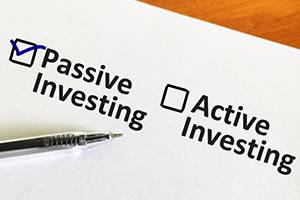Famous American investor and author Peter Lynch once said, “Most individual investors would be better off in an index mutual fund.” As an individual investor, you may wonder about the rationale behind this statement. Why is it a good idea to invest in passive funds when, in active funds, experienced fund managers are working to try and offer you better results than the market? Is it not common sense that professional fund managers should be able to beat the market and provide you with better returns? Well, the market begs to differ.
As a beast that no one has been able to tame or predict completely, the equity market has long been known for its idiosyncratic nature and its ability to outwit even the best of the best. So, what should you, as an individual investor keen on participating in stock market growth, do in this scenario? Should you opt for active funds, or stick with the market and place your bets on passive equity funds or exchange traded funds?
Why you should pick passive funds
There has been a long-standing debate between timing the market and time in the market. While active funds try to time the market and take steps to earn returns by betting on or against the market, passive funds offer you strong returns by sticking with the market through thick and thin. With passive funds, the longer you spend in the market, the better your returns. As an individual investor, passive funds are a good option for you as they offer steady returns, charge lower fees, and require low maintenance, which means that you need not track the market or monitor your investments on a regular basis.
Other advantages of investing in passive funds include the lower risk posed by the same. This is because your investment is tracking the market – therefore, your returns will not be impacted by the faulty judgements or wrong decisions of fund managers. Further, most passive investors stay in the market for a longer duration, meaning that you will end up paying lower capital gains at the end of the journey. Also, passive funds are not limited to the stock market. If you are a risk averse investor who wishes to stick to the debt market, you can also choose to invest in passive debt funds.
Passive funds for long-term investment
American investor John Bogle once said, “The miracle of compounding returns is overwhelmed by the tyranny of compounding costs” and this statement makes the most sense when we look at the difference between active and passive funds. One of the biggest differences between the two is the commission or fee charged by mutual funds. Active funds, which are managed by professional fund managers who try to beat the market in the search for higher returns, charge you a higher commission for fund management. On the other hand, passive funds track the market and offer you returns which are in line with the market, but they charge negligible fess as there is no active fund management required.
Over the longer term, the fess you spend on active management end up eating into your investible corpus, taking away a chunk of the money that could, otherwise, have been used to purchase more units in the mutual fund. Passive funds, on the other hand, allow you to invest almost all your money in mutual fund units, and this plays a defining role in how much returns you actually earn in the long run. And this is what Bogle means when he said that compounding costs eat into the compounding returns you stand to earn, when you invest in active funds. He further emphasised this point when he stated that “Great rewards grow from small differences in cost”, and that is exactly where both passive equity funds and passive debt funds one-up active funds, when picking your options for long-term investments.
Now that you know why passive funds could be a great choice for you, as an individual investor, you know where to look when you think of starting a long-term investment.
An investor education initiative by Edelweiss Mutual Fund
All Mutual Fund Investors have to go through a one-time KYC process. Investors should deal only with
Registered Mutual Fund (RMF). For more info on KYC, RMF and procedure to lodge/redress any
complaints, visit - https://www.edelweissmf.com/kyc-norms
MUTUAL FUND INVESTMENTS ARE SUBJECT TO MARKET RISKS. READ ALL SCHEME-RELATED DOCUMENTS CAREFULLY
Trending Articles
MUTUAL FUND INVESTMENTS ARE SUBJECT TO MARKET RISKS, READ ALL SCHEME RELATED DOCUMENTS CAREFULLY.




















